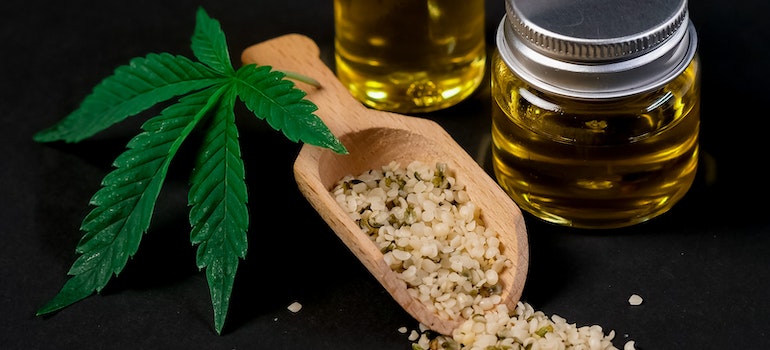Slowly sailing down the path to recovery from addiction can be challenging, but there are tools and resources available that can make the journey smoother. Among these, using CBD in addiction recovery is gaining traction as a potential aid. For veterans seeking support at addiction treatment centers in West Virginia, it can be an effective step in finding holistic methods. This natural compound derived from the cannabis plant offers a range of potential advantages without the high associated with THC.
Introducing CBD: A Natural Component for Holistic Recovery
CBD, or cannabidiol, is a natural compound in the cannabis plant. Contrary to popular belief, it doesn’t induce the “high” commonly associated with marijuana. Another compound, THC (tetrahydrocannabinol), causes this high effect. Some addiction treatment centers offering holistic therapy for addiction in WV have incorporated CBD due to its potential therapeutic properties. Utilizing CBD for recovery from addiction, many individuals in Ohio and West Virginia have found an alternative method that complements traditional treatments without the mind-altering effects of THC.

Neurological Aspects of Addiction and CBD’s Potential Role
Addiction is a complex and multifaceted condition that deeply affects the brain’s neural pathways.
Here’s how:
- Drugs and alcohol can stimulate the production of certain neurotransmitters, causing feelings of euphoria. Over time, the brain relies on the substance to feel pleasure or avoid pain.
- The amygdala, prefrontal cortex, and nucleus accumbens are regions of the brain that play vital roles in addiction. These areas control decision-making, emotional responses, and the reward system.
- Substances can cause homeostasis disruption. Chronic substance use can disrupt the brain’s natural balance, making recovery challenging.
With the rising prominence of cognitive behavioral therapy for substance use disorders in West Virginia, the interplay between CBD and the endocannabinoid system has gained attention. The endocannabinoid system, intrinsic to our bodies, influences mood, stress, and pleasure. By interacting with this system, CBD can potentially help restore balance, alleviate withdrawal symptoms, and reduce cravings.
Potential Benefits of CBD and Its Impact on Addiction Recovery
Addiction, especially for our brave veterans, often intertwines with experiences, traumas, and memories that run deep. When thoughtfully incorporated into a comprehensive recovery plan, CBD might offer many benefits that can address both the physical and emotional facets of recovery.

Managing Anxiety and Stress
Many in recovery face heightened anxiety and stress levels. Symptoms include:
- Racing thoughts
- Increased heart rate
- Feeling overwhelmed
- Irritability
- Panic attacks
In family therapy for addiction and from personal testimonials, we observe that CBD might help mitigate some of these symptoms. By potentially reducing anxiety and stress, the chances of relapse decrease, paving the way for emotional stability and well-being.
Pain Relief and Reducing Medication Dependency
Pain—be it emotional or physical—often accompanies addiction recovery. Here are some common pain types:
- Muscle aches
- Joint pain
- Headaches
- Stomach discomfort
Through personalized insights gained in individual therapy for addiction, it has become evident that the potential analgesic properties of CBD might offer some relief from these pain manifestations. Exploring deeper, CBD not only provides a possible solution to managing withdrawal symptoms and co-occurring pain conditions but also offers a promising alternative that could reduce the heavy dependence on opioid-based pain medications, guiding individuals toward a more natural pain management approach.
Addressing Insomnia and Sleep Disturbances
Sleep serves as the body’s natural restoration mechanism. However, sleep remains an elusive reprieve for many journeying through recovery, often disrupted and fragmented. Some strategies to harness better sleep encompass:
- Crafting a consistent bedtime routine
- Minimizing screen exposure in the evening hours
- Cultivating a tranquil bedroom ambiance
- Delving into natural aids, like CBD, known for potential sleep-enhancing benefits

In the collaborative setting of group therapy for addiction, individuals find solace in shared narratives and gain insights from peers. CBD emerges as a topic of interest, especially for its purported ability to counter insomnia, a frequent complaint among those in recovery. These stories show how important getting good sleep is for healing and feeling mentally and physically well.
Supporting Neuroprotection and Cognitive Function
As addiction takes its toll on the brain, the need for neuroprotection becomes evident. Cognitive function, too, often suffers during prolonged substance abuse. Here’s where CBD might offer a helping hand:
Neuroprotective Properties
Emerging research consistently highlights the potential of CBD in acting as a guardian for the brain. These studies indicate that CBD may work diligently to counteract damage by diminishing inflammation and warding off oxidative stress—common culprits behind neuronal degradation. For those individuals whose neural pathways and brain structures have weathered the storm due to extended periods of drug or alcohol misuse, the neuroprotective role of CBD could provide a beacon of hope, aiding in the restoration and preservation of essential brain functions.
Boosting Cognitive Function
As we delve deeper into the world of holistic recovery, the potential of CBD as a cognitive enhancer comes to light. Incorporating CBD into addiction recovery may enhance mental clarity and boost cognitive functions, leading to sharper thinking. Enhanced cognition facilitates more informed decision-making and reinforces an individual’s resolve and determination, vital pillars in maintaining steadfastness on the road to recovery.
Minimizing Nausea and Appetite Regulation
Detoxification, an integral part of recovery, sometimes brings unwelcome symptoms like nausea. Additionally, appetite fluctuations can challenge one’s health. CBD could help with:
- Nausea
- Appetite regulation
Anti-Nausea
Detoxification, a crucial step in the journey toward sobriety, often comes with challenging symptoms, chief among them being nausea and vomiting. With its potential antiemetic properties, CBD stands out as a natural ally in this battle. By possibly alleviating these unsettling symptoms, CBD may ensure a more comfortable and humane detoxification process, allowing individuals to focus on their path forward without being sidetracked by debilitating physical sensations. This smoother transition is crucial for physical comfort and bolstering mental resolve during the initial stages of recovery.
Appetite Regulation
During addiction therapy, the holistic well-being of an individual is placed front and center. It includes emphasizing the importance of nutrition and its role in healing. Disrupted appetite, either excessive or deficient, can pose significant challenges. In this context, CBD can be a potential balancer, possibly fine-tuning appetite to optimal levels. For those grappling with eating disorders or erratic eating patterns as a side effect of their previous substance use, the potential regulatory impact of CBD can offer a supportive hand, ensuring that the body receives the nutrients it needs to repair and rejuvenate.
The Non-Addictive Nature of Using CBD in Addiction Recovery
Steering away from addictive substances is the cornerstone of recovery. Fortunately, CBD’s nature aligns with this principle. CBD is non-intoxicating and non-addictive, unlike some medications with the risk of dependency. For veterans and others struggling with addiction in Ohio, this makes it an appealing option when considering a rehab center near Cambridge OH. As an alternative, CBD might offer symptomatic relief without the shadow of potential addiction.
Holistic Therapies and CBD: A Dual Approach
Those familiar with holistic therapy will understand the emphasis on treating the whole person — mind, body, and spirit. CBD can be a pivotal part of this holistic approach, impacting:
- Mind – CBD’s potential anxiolytic effects might aid in mental well-being. It could act as a buffer against anxiety, depressive symptoms, and mood fluctuations, offering psychological stability during recovery.
- Body – Physical symptoms, from pain to insomnia, can deter one’s progress. By possibly mitigating these symptoms, CBD assists the body in its healing process.
- Spirit – Holistic therapies often emphasize spiritual healing. While CBD doesn’t directly influence spirituality, it might provide a clearer path for individuals to engage in spiritual self-reflection and growth by potentially easing physical and mental discomforts.

Veterans and Unique Challenges: How Using CBD in Addiction Recovery Might Help
Veterans from Ohio and West Virginia face unique challenges during addiction recovery. Traumatic experiences, PTSD, and physical injuries complicate the recovery journey. Here’s how using CBD in addiction recovery can help:
- PTSD and trauma: CBD might offer hope in managing PTSD-related symptoms. Its potential in regulating fear memories and decreasing anxiety could benefit veterans grappling with traumatic memories.
- Physical injuries: Chronic pain stemming from combat injuries is a grim reality for many veterans. CBD’s potential analgesic properties might provide natural pain relief, reducing dependency on opioids or other pain medications.
- Social reintegration: Transitioning back to civilian life post-service is daunting. Anxiety, societal pressures, and the emotional burden can be overwhelming. As part of a comprehensive therapy strategy, CBD might act as an emotional stabilizer, aiding smoother reintegration.
Dosing and Consumption of CBD: What to Know
Understanding CBD dosage is crucial. Too little might be ineffective, while excessive amounts could lead to undesired side effects. Here’s what you can do:
- Start low and go slow. Begin with a low dose and gradually increase until you find your optimal amount.
- Method matters. CBD can be consumed in various ways – tinctures, capsules, edibles, and topicals. Each has its onset time and duration. Veterans should discuss the best method for their needs with healthcare professionals.
- Monitor and adjust. Everyone’s body reacts differently. Regularly assess how you feel and adjust the dose if necessary.
Importance of Professional Guidance and Comprehensive Planning
While the potential benefits of CBD are promising, it’s crucial to understand its role within a broader recovery framework.
Just as a patient would discuss any new treatment in a rehab center Huntington WV is proud to offer, individuals should openly converse with healthcare providers about their intent to use CBD. It tailors the approach to their unique needs and identifies potential drug interactions.

CBD is one of many tools in the recovery toolkit. You should also pursue treatments like cognitive-behavioral therapy, family and individual therapy, and other holistic approaches. It’s about creating a comprehensive plan that addresses recovery’s physical, emotional, and mental facets.
CBD’s Legal Status and Importance of Authentic Sourcing
We’ve come to probably the most expected part: understanding CBD’s legal intricacies, especially in Ohio and West Virginia. Here’s what you should know:
- In Ohio, as of my last update in 2021, CBD derived from hemp (with less than 0.3% THC) is legal for sale and consumption.
- In West Virginia, hemp-derived CBD is legal, but always ensure you adhere to state-specific regulations.
- Always source CBD from reputable suppliers. Look for third-party lab testing and certifications to ensure product quality and authenticity.
It’s crucial to remember that while the landscape of CBD legality may seem straightforward, it’s always in flux. Stay informed. Prioritize safety and authenticity in every purchase, ensuring your journey with CBD in addiction recovery is built on trust and transparency.
The Need for More Research and Understanding of CBD
Approaching CBD’s role in addiction recovery must be done with an open but discerning mind. While many individuals have reported benefits, comprehensive clinical studies are still developing.
Hence:
- Stay updated on the latest research regarding CBD’s efficacy in addiction recovery.
- Always weigh the potential benefits against any possible side effects or interactions.
- Engage in community discussions and seek testimonials, but remain cautious about anecdotal evidence.
CBD’s Role in Aiding Addiction Recovery
The journey of recovery is deeply personal and multifaceted. Using CBD in addiction recovery offers a promising, natural adjunct to traditional treatment methods. With its potential benefits ranging from anxiety relief to neuroprotection, it’s easy to see why many are considering this path. However, it’s imperative to consult professionals, ensure legal compliance, and stay informed about the latest research. For Ohio and West Virginia veterans, embracing comprehensive, informed approaches can be the key to a brighter, sober future.



